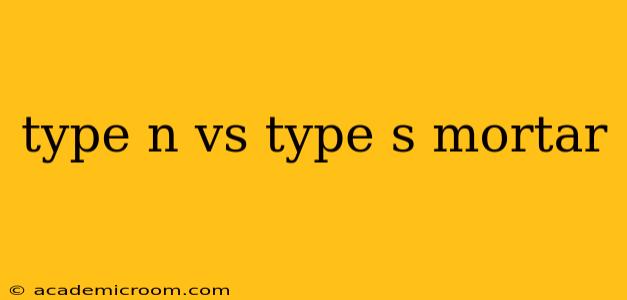Choosing the right mortar is crucial for any masonry project, ensuring the longevity and structural integrity of your work. Two common types, Type N and Type S, often leave builders wondering which is the best fit. This comprehensive guide will delve into the differences between Type N and Type S mortar, helping you make an informed decision based on your specific needs. We'll explore their properties, applications, and limitations to clarify the ideal choice for your next masonry project.
What is Type N Mortar?
Type N mortar is a medium-strength, general-purpose mortar suitable for a wide range of masonry applications. Its versatility makes it a popular choice for many projects. It offers a balance between strength and workability, making it relatively easy to handle and apply. The "N" stands for "normal," reflecting its common usage and moderate properties.
Key Properties of Type N Mortar:
- Moderate Strength: Type N provides sufficient strength for many applications, including interior and exterior walls, and less demanding structural elements.
- Good Workability: Its consistency allows for easier application and shaping, making it a preferred choice for DIY projects and experienced masons alike.
- Versatility: Its balance of properties makes it adaptable to various masonry units, including brick, block, and stone.
- Moderate Water Retention: Type N mortar retains sufficient water to ensure proper hydration and curing of the cement, leading to a strong bond.
What is Type S Mortar?
Type S mortar, on the other hand, is a high-strength mortar designed for applications requiring superior structural integrity. The "S" designates its high strength, making it ideal for situations where greater load-bearing capacity is essential. This strength comes at the cost of potentially reduced workability compared to Type N.
Key Properties of Type S Mortar:
- High Strength: This is the defining characteristic of Type S, making it suitable for load-bearing walls, retaining walls, and other structurally demanding applications.
- Lower Workability: Compared to Type N, Type S can be stiffer and more challenging to work with, requiring more experienced handling.
- Increased Durability: Its higher strength translates to improved durability and resistance to weathering and cracking over time.
- Suitable for High-Stress Applications: Type S is specifically formulated for situations where the mortar needs to withstand significant compressive forces.
Type N vs. Type S Mortar: Key Differences Summarized
| Feature | Type N Mortar | Type S Mortar |
|---|---|---|
| Strength | Moderate | High |
| Workability | Good | Lower |
| Application | General-purpose, less demanding | High-stress, load-bearing |
| Cost | Generally less expensive | Generally more expensive |
| Water Retention | Moderate | Can vary depending on formulation |
Which Mortar Should I Choose? Type N or Type S?
The choice between Type N and Type S mortar ultimately depends on the specific requirements of your project.
-
Choose Type N mortar for:
- Interior and exterior non-load-bearing walls.
- Veneer applications.
- Projects where workability is a priority.
- Less demanding structural elements.
-
Choose Type S mortar for:
- Load-bearing walls.
- Retaining walls.
- Applications requiring high compressive strength.
- Projects demanding exceptional durability and resistance to weathering.
What are the Different Types of Mortar? (Addressing a common PAA question)
Mortar types are categorized by their compressive strength and other properties. Beyond Type N and Type S, other types include:
- Type M: High-strength mortar suitable for severe exposure conditions and exceptionally high-stress applications.
- Type O: Low-strength mortar used primarily for interior non-load-bearing applications where high strength isn't required.
- Type K: A low-strength mortar, even weaker than Type O, used mainly for historic preservation projects where minimal strength is desired to avoid damage to existing structures.
Each type has specific applications and properties, ensuring the right mortar is chosen for each unique situation.
What is the Best Mortar for Brick? (Addressing another common PAA question)
The best mortar for brick depends on the application. For general bricklaying, especially for non-load-bearing walls, Type N mortar is frequently used due to its good workability and sufficient strength. For load-bearing brickwork or projects in harsh climates, Type S mortar may be more appropriate due to its superior strength and durability. Always check local building codes and consult with a structural engineer for critical applications.
How to Choose the Right Mortar for Your Project (Addressing a potential PAA question)
Choosing the correct mortar involves careful consideration of several factors:
- Structural requirements: Is the wall load-bearing or non-load-bearing?
- Exposure conditions: Will the wall be exposed to harsh weather conditions (e.g., freezing temperatures, rain)?
- Type of masonry unit: The type of brick, block, or stone will influence the choice of mortar.
- Local building codes: Always comply with local regulations and building codes.
- Professional advice: Consult with a masonry professional or structural engineer for complex or critical projects.
By understanding the nuances of Type N and Type S mortar and considering the factors outlined above, you can ensure the success and longevity of your masonry project. Remember, choosing the correct mortar is vital for both safety and aesthetic appeal.
